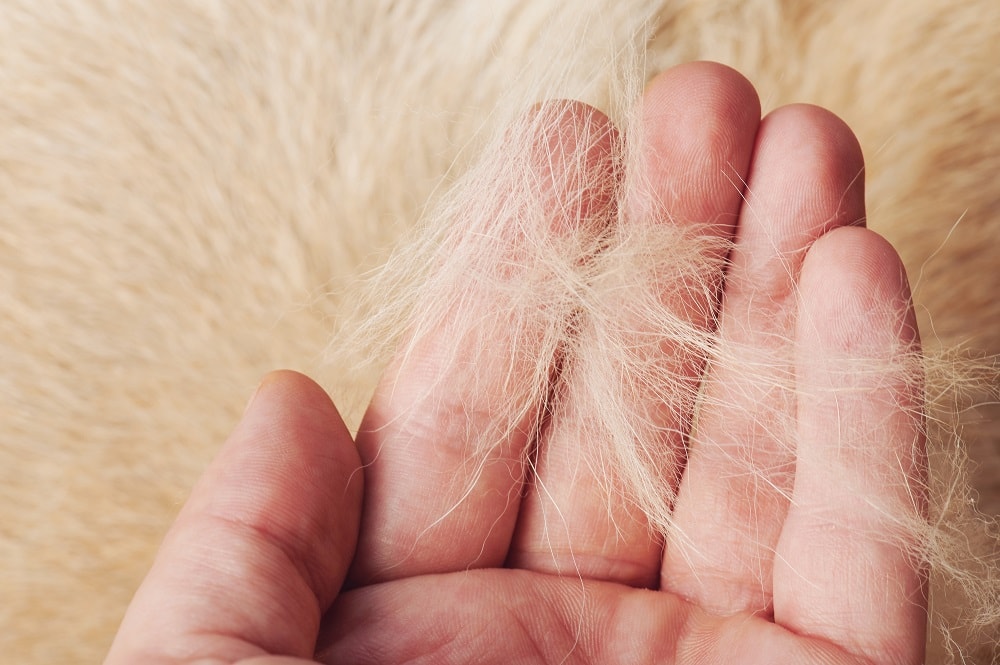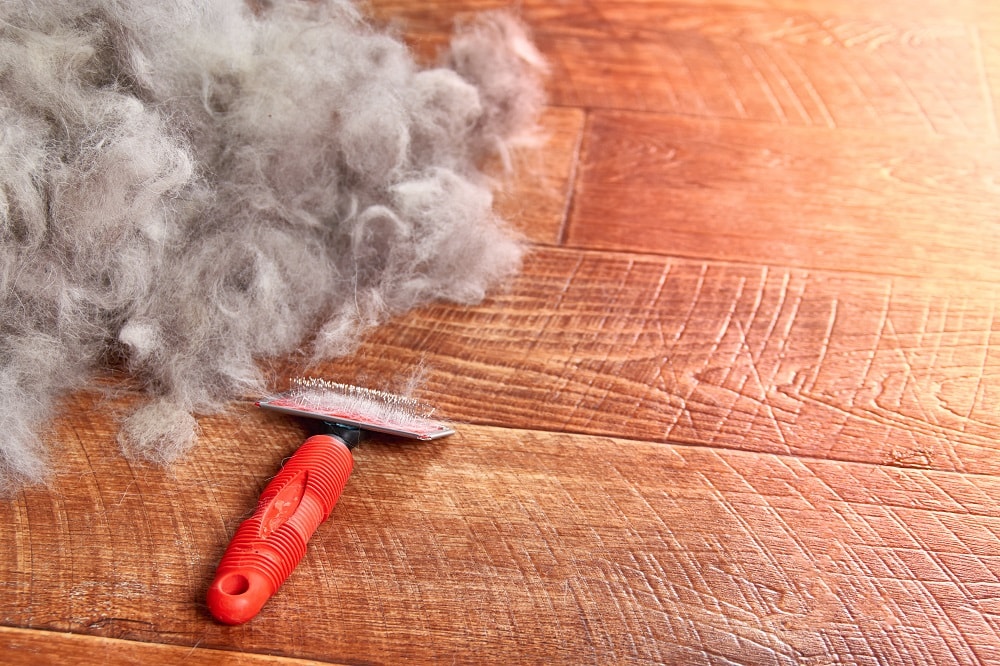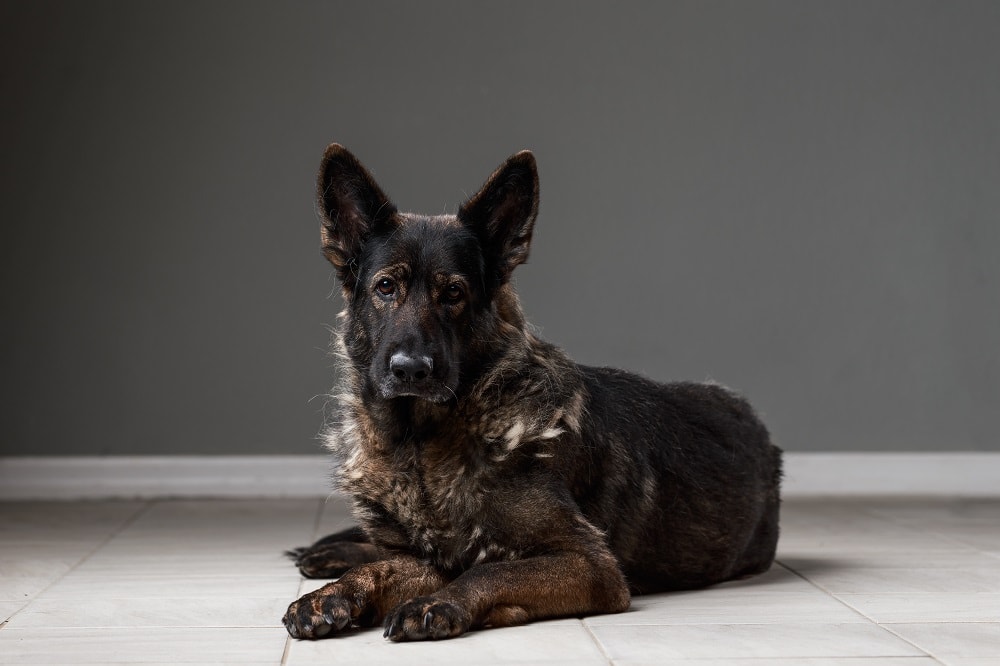Find out everything you need to know about German Shepherd shedding, including how long it lasts, how bad is it, and know what you can do to keep it under control.
The German Shepherd is one of the most popular dog breeds for many reasons. And let’s face it, who wouldn’t want such an intelligent, courageous, and loyal canine companion!
But before you bring a German Shepherd home, you should know that their thick and plush double coat sheds, a lot! While having a dog that sheds might not be a deal-breaker, you should find out what exactly you’re getting yourself into.
How bad is German Shepherd shedding? German Shepherds shed all year long, which has earned them the nickname “German shedders”. They also go through seasonal shedding twice a year, when they shed their undercoat, losing a huge amount of hair. Shedding can’t be stopped, but it can be reduced with regular brushing and a high-quality diet.
To keep the shedding under control you will have to brush your German Shepherd at least three times a week and daily during the shedding season. However, excessive shedding can also be a sign of an underlying health condition so read on to find out more!
How Much Do German Shepherds Shed?
The fact that German Shepherds are nicknamed the German shedders should give you a clear idea of what to expect when you bring one home!
Regardless of your German Shepherd’s coat type and length, this dog breed sheds a lot and will leave loose hair everywhere.
If you are serious about getting a German Shepherd, be prepared to clean and vacuum at least twice a week. Also, don’t be surprised to find dog hairs embedded in your clothes and upholstery even if you stick to a regular cleaning schedule.
On occasion, you will also have to deal with large tufts of hair flying through your house like tumbleweeds in the wild west!
When Do German Shepherds Shed?
Being a double-coated dog breed, German Shepherds shed all year long, but are regardless classified as seasonal shedders.
This means that besides losing a steady amount of hair each day, your German shedder will also “blow out” his coat twice a year during the shedding season (source).
Even if you think that your German Shepherd can’t possibly lose more hair without getting bald, you’ll be shocked to learn that he can and will shed even more.
During the shedding season, German Shepherds will shed a tremendous amount of hair within a very short period and their coat will look no worse for wear.
Why Do German Shepherds Shed?

Shedding is a natural occurrence for all dogs, including German Shepherds, and is closely linked with the amount of sunlight. So, as the days get shorter or longer, your dog’s hormone levels will change, thus kick-starting the shedding process.
As the winter comes knocking and days get shorter, these hormonal changes will spur your German Shepherd to shed his summer coat.
This is a necessary process and the only way a dog can grow a thick coat that will keep him warm during the winter.
Similarly, as the days get longer and as summer approaches, German Shepherds no longer need so much fur and will go through a heavy shed.
So when the spring comes, you will find that your German shedder is leaving tufts of fur all over your house, furniture, and backyard.
While it might seem like a real nuisance, seasonal shedding is completely normal, and you should be ready to deal with it twice a year.
Factors that Affects German Shepherd Shedding
Shepherd shedding is something you should expect and be ready for if you decide to welcome this breed into your home. However, you should know that excessive shedding can be a sign of health problems (source).
But before your rush to any conclusions here is the most common reasons behind excessive shedding:
Parasites
Besides being a real nuisance for you, fleas and ticks will make your dog very itchy and uncomfortable which generally leads to scratching and more shedding.
It’s pretty obvious when a dog has fleas, but just to be sure, do a proper inspection. If your suspicions are correct, use flea and tick control products to kill all the fleas and larvae and to protect your dog from future infestations.
You will also have to treat your home for fleas, especially your dog’s bed, crate, and his favorite lounging areas.
Fungus
Dog fungal skin infections are extremely common and can affect your dog’s coat, skin, and nails. Symptoms of fungal infections include hair loss, itching, dry skin, brittle nails, bald spots, and excessive scratching.
If your German Shepherd experiences any of these problems, take him to your vet who will run tests to pinpoint the type of fungus and start treatment.
Allergies
Just like people, dogs too can suffer from food or environmental related allergies. Allergies can cause itchy and inflamed skin, which leads to more scratching and excessive shedding (source).
Other symptoms of allergies include:
- Sneezing
- Red and watery eyes
- Patches of fur missing
- Excessive scratching
- Red, inflamed, and infected ears
If you suspect that your German Shepherd has allergies, schedule an appointment with your vet who will be able to determine the exact cause.
Medications
Certain meds are known to cause hair loss in both long-haired and short-haired dogs and can cause more harm than good in the long run.
For example, if your German Shepherd is treated with steroids for a prolonged period of time, it’s highly likely that he will start to shed even more than usual,
Long term steroid use can cause your dog to develop bald spots since these meds affect the growth of hair follicles. Furthermore, your German Shepherd will continue to shed excessively and sport bald patches as long as he is treated with steroids.
Recommended Post: German dog commands, help them learn new tricks!
Other health concerns
Sometimes excessive shedding can be just a symptom of a much more serious condition, so you should take your German Shepherd to a vet just to be on the safe side.
The most common diseases that might cause shedding are:
- Hyperthyroidism
- Cushing’s disease
- Addison’s disease
- Kidney failure
- Liver failure
- Cancer
How to Reduce German Shepherd Shedding?

Now that you know that German Shepherds shed a lot, you’re probably eager to find out if there is something that reduces shedding!
Although you can’t stop it altogether, there are ways you can control dog shed:
Grooming
Regular brushing is the best way you can control how much loose hair your German Shepherd is leaving around your home.
Generally, you should brush your German Shepherd at least three times a week. For the best results use an undercoat rake and a slicker brush which will remove loose hairs from the outer coat and the undercoat.
On the other hand, you should brush your German Shepherd every day during the shedding season. Use de-shed tools to remove as much dead hair as you can before it ends on your floors and furniture.
Besides regular brushing, bathing your German Shepherd can also reduce shedding. Bathe your dog every four to five months to remove all dead hair and keep his coat looking and smelling great (source).
Learn when and how long to brush your German Shepherd in this video below:
Food
Poor diet is one of the major causes of excessive shedding and cheaper, unbalanced foods are the biggest culprits.
Without high-quality and balanced dog food, your German Shepherd won’t get proper nutrients and omega fatty acids which are important for his coat and skin health.
Dogs who suffer from nutrient deficiencies have dry, flaky skin and dull coats that shed a lot and are prone to matting.
Hence, you should look for high-quality foods that have named meat as the main ingredient, lots of proteins, fats, and omega 3 and 6 fatty acids that support skin and coat health (source).
If your dog isn’t getting enough omega fatty acids from this diet, you should talk with your vet and see if he can benefit from supplements in the form of fish oil or tablets.
Related Questions:
How do I get my German Shepherd to stop shedding?
Feed your German Shepherd with high-quality dog food and brush him at least three times a week to reduce shedding. Avoid feeding foods that contain filler grains and invest in a slicker brush and de-shedding tool to stop shedding.
Is it normal for German Shepherd to shed a lot?
German Shepherds are known to shed a lot! They will shed all year long and go through shedding season twice a year when they “blow” their undercoat.
How long do German Shepherds shed?
German Shepherds have a thick double coat and they shed 365 days a year. Furthermore, twice a year they will go through a heavy shed which will leave them without an undercoat and produce a huge amount of loose hair.
How often should I bathe my German Shepherd?
If your German Shepherd has healthy skin and coat you should bathe him once in four months. Excessive bathing should be avoided since it can dry up your dog’s skin and cause excessive shedding.
Conclusion
Despite being heavy shedders, German Shepherds are one of the most popular and beloved dog breeds. Although frequent vacuuming and cleaning are unavoidable when you own one, you can reduce your dog’s shedding with regular brushing, bathing, and balanced nutrition.
But if despite your best efforts your German Shepherd continues to shed a lot, you should check him for fleas and make an appointment with your vet to rule out any underlying conditions.
And if he gets a clean bill of health, there’s nothing much you can do except brush some more and be happy that nothing’s wrong with your beloved pooch!


0 Comments